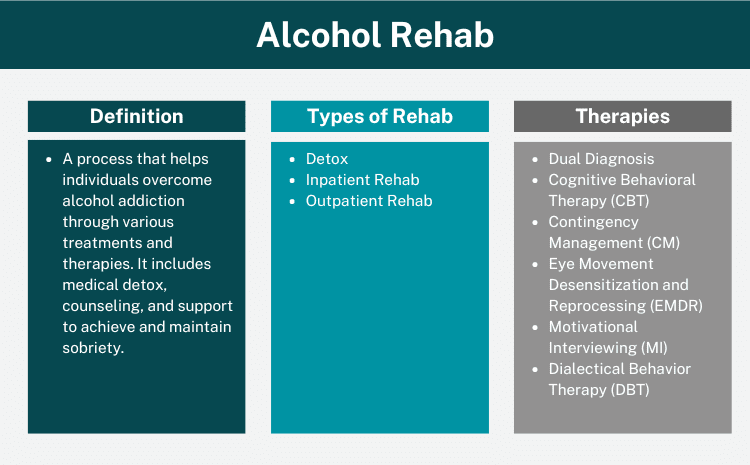Alcohol Rehab: Comprehensive Guide to Treatment and Recovery
Alcohol use disorder impacts people from all walks of life. It doesn’t just affect the individual struggling with addiction; it also takes a toll on families, loved ones, and entire communities.
Each year, more than 88,000 people die from alcohol-related deaths in the United States, according to the Centers for Disease Control and Prevention (CDC), affecting not just the individuals but also their families, friends, and communities. This fact can be overwhelming, but there is hope. Seeking help through alcohol rehab can be a crucial step toward recovery.
To assist those on this path, this guide provides a comprehensive overview of alcohol rehab. It explores different treatment options and offers support for those on their recovery journey. Understanding the available resources and approaches can make a significant difference in overcoming alcohol addiction.

Understanding Alcohol Addiction
The first thing we need to understand is alcohol addiction. It occurs when someone can’t control their drinking, even when it causes them harm or distress. This leads to significant problems in their social life, jobs, and health. It often results in poor judgment, relationship issues, financial troubles, and both physical and mental health problems.
The reasons behind alcohol addiction can depend on different factors, like genetics and environmental triggers. Recognizing these factors is key to understanding how addiction develops and how it can be effectively treated.
Signs of Alcohol Abuse
Recognizing the signs of alcohol abuse is crucial for early intervention. If you or someone you know exhibits any of the following behaviors, it may indicate a problem with alcohol:
- Drinking as Stress Relief: Using alcohol to cope with stress or unwind regularly.
- Defensiveness About Drinking: Becoming defensive or angry when questioned about drinking habits.
- High Tolerance: Needing more alcohol to achieve the same effects.
- Personality Changes: Exhibiting noticeable changes in behavior or personality.
- Drinking All Day: Consuming alcohol throughout the day.
- Not Knowing When to Quit: Inability to stop drinking once started.
- Withdrawal Symptoms: Experiencing symptoms like shaking, sweating, or nausea when not drinking.
Being aware of these signs can help you understand when it’s time to seek help for alcoholism.
Understanding Alcoholism Treatment
Once the signs of alcohol abuse are recognized, the next step is seeking treatment. Alcoholism treatment helps people recover from addiction using various methods and therapies to address the physical, emotional, and mental aspects of addiction. Understanding these options can help individuals find the best path to recovery.
Types of Alcoholism Rehab
When it comes to alcohol rehab, two main options are available: inpatient and outpatient programs. Each offers unique benefits and caters to different needs. Understanding these rehab options is essential in choosing the right treatment center for your recovery.
Inpatient Rehab
Treatment programs that offer Inpatient rehab or residential treatment provide intensive, 24/7 care for people struggling with addiction. Patients live at the rehab center for 30 to 90 days, fully focusing on recovery. The program includes medical detox, therapy, counseling, and educational sessions.
Inpatient care offers several key benefits:
- Structured Environment: Offers a stable place away from triggers and stress.
- 24/7 Support: Access to medical and emotional help at all times.
- Comprehensive Care: Includes detox, therapy, counseling, and education.
- Focus on Recovery: Allows full focus on getting better without distractions.
- Peer Support: Builds a supportive community with others in recovery.
Outpatient Rehab
Outpatient rehab is a flexible treatment option that does not require overnight stays at a facility. It offers therapy, education, and support in a structured setting while allowing individuals to live at home and continue their daily routines. This type of outpatient care is ideal for those with milder addictions or those transitioning from inpatient treatment.
Outpatient Treatment Benefits:
- Flexibility: Allows patients to continue their daily lives while receiving treatment.
- Lower Cost: Generally less expensive than inpatient rehab.
- Support System: Enables individuals to stay connected with family and friends.
- Continuity: Provides ongoing support to help maintain sobriety.
Things to Consider When Selecting a Rehab
Choosing the right alcohol rehab center is crucial for a successful recovery. Here are some important factors to think about to make sure you or your loved one gets the best care possible.
Medical Condition
Consider any existing medical conditions when selecting a rehab center. Some facilities are equipped to handle complex medical needs, providing specialized care alongside addiction treatment.
Traveling for Rehab
Traveling for rehab can provide a fresh start and remove you from familiar environments that may trigger your addiction. However, it also means being away from your support system. Weigh the pros and cons of attending a local rehab center versus one farther away.
Financial Options
Rehab can be expensive, so it’s important to explore your financial options. Check if your insurance coverage includes treatment, and ask about payment plans or sliding scale fees. Many rehab centers offer financial assistance to make treatment more accessible.
Stages of Alcoholism Treatment
Alcohol treatment is a process that involves several stages. Each stage is designed to help individuals achieve and maintain sobriety. Understanding these stages can help you or your loved one navigate the path to recovery effectively.
Alcohol Detox
The first step in recovery is usually detox, which involves removing alcohol from your system and managing withdrawal symptoms. These symptoms can range from mild, like headaches and nausea, to severe, such as seizures and hallucinations. Detox should be done under medical supervision to ensure safety and comfort.
Detox Timeline
The alcohol detox process involves removing alcohol from the body and managing withdrawal symptoms. It typically follows these stages:
- First Six to Twelve Hours: Symptoms begin, including nausea, hand tremors, anxiety, trouble sleeping, and irritability.
- Day One: Symptoms intensify, potentially including disorientation, stronger hand tremors, and seizures.
- Day Two: Severe symptoms like hallucinations and panic attacks are common, with a high risk for seizures.
- Days Three to Seven: Some individuals may experience delirium tremens (DTs), which include confusion, racing heart, high blood pressure, fever, and heavy sweating.
- After One Week: Most severe symptoms subside, but mild symptoms like anxiety, insomnia, and mood swings may continue.
Alcohol Rehabilitation
Following detox, the next step in recovery is alcohol rehabilitation. This phase includes various therapies and counseling sessions to address the psychological aspects of addiction. Patients participate in individual and group therapy, learning coping strategies and life skills to prevent relapse.
Types of Therapy
To treat alcohol addiction, rehab centers use different types of therapy. Here are some common ones:
- Dual Diagnosis: Treats both addiction and any co-occurring mental health issues.
- Cognitive Behavioral Therapy (CBT): Helps change negative thought patterns and behaviors.
- Contingency Management (CM): Rewards positive behaviors to encourage them.
- Eye Movement Desensitization and Reprocessing (EMDR): Uses eye movements to help process trauma.
- Motivational Interviewing (MI): Boosts motivation to change harmful behaviors.
- Dialectical Behavior Therapy (DBT): Combines CBT with mindfulness techniques.
- Rational Emotive Behavior Therapy (REBT): Focuses on changing irrational beliefs and promoting rational thinking.
Aftercare
Aftercare is crucial because the risk of relapse is highest in the first few months after completing a treatment program. By participating in aftercare programs, individuals receive ongoing support, guidance, and resources to help them navigate the challenges of maintaining their sobriety. Aftercare also allows individuals to continue working on issues surrounding their addiction and develop healthy coping mechanisms.
When to Seek Alcohol Addiction Treatment
Recognizing the signs of alcohol use disorder (AUD) is crucial for knowing when to seek help from rehab facilities. If you identify with any of the following behaviors, it may be time to consider treatment for substance use disorders.
- Recognize the Behaviors: Continuing to drink longer than planned and frequent hangovers.
- Unsuccessful Attempts to Quit: Trying to cut down or stop drinking but failing.
- Interference With Your Life: Experiencing problems at work, school, or in personal relationships.
- Loss of Interests: Neglecting hobbies and replacing them with drinking.
- Engaging in Risky Behavior: Drunk driving, unsafe sex, or experimenting with other substances.
- The Onset of Co-occurring Disorders: Drinking to cope with mental health disorders such as anxiety or depression or developing these issues due to drinking.
- Desire to Drink More: Needing more alcohol to feel the same effects, indicating tolerance and dependence.
- Alcohol Withdrawal Symptoms: Experiencing symptoms like shaking, sweating, or nausea after not drinking.
- Changes in Your Social Circle: Surrounding yourself with people who also struggle with AUD.
Finding the Right Rehab Center
Finding the right rehab center is crucial for a successful recovery. Consider factors like the type of treatment offered, location, and cost. Make sure the facility meets your specific needs and provides a supportive environment. Researching and visiting potential centers can help you make an informed decision.
Get Help Today
You can locate alcohol detox programs in your area through several methods. If you have health insurance, contact your provider for a list of approved in-network programs. Additionally, use a rehab directory to find a treatment center close to you.
If you or a loved one is struggling with alcoholism and seeking treatment options, reach out to a treatment provider today. Getting professional help is a crucial step towards recovery and long-term sobriety.
Conclusion
If you or a loved one is struggling with alcohol addiction, don’t wait to seek help. You can find the support and treatment you need through the ReachRecovere directory. Visit our free rehab directory to explore a wide range of rehab facilities and find the right one for your recovery journey. Your path to sobriety starts with reaching out for help today.
Table of Contents
RELATED PAGES Alcohol Addiction
- Alcohol Addiction
- Alcoholism
- Effects of Alcohol
- Alcohol Rehab
- Alcohol Recovery
- Effects of Alcoholism on Families
- Mixing Drugs and Alcohol
Alcohol FAQs
- Am I An Alcoholic?
- Alcohol Facts and Stats
- How Long Does Alcohol Stay in Your System?
- Is Alcoholism a Disease or a Choice?
